Moon on Dome with Venus & Mercury,
Orion Nebula
Posted: 8 February 2020
Wednesday, 5 February 2020, was cloudy. The sky was mostly clear during the day on Thursday, 6 February. However, unforecasted increasing cloudiness began late afternoon so I cancelled my planned session in the observatory for that night. Friday, 7 February, was clear.
|
Open: Friday, 7 February 2020, 1815 MST Temperature: 67°F |
Session: 1434 Conditions: Clear |
Equipment:
12" f/8 LX600 w/StarLock
2" 24mm UWA eyepiece
2" 30mm eyepiece
Camera:
D850 DSLR
iPhone 11 Pro Max
1819 MST: LX600 ON, StarLock OFF, High Precision OFF.
Viewed Mercury, low in the western sky, 102X. A half-phase was visible.
Viewed Venus, 102X. A similar phase was visible.
1840 MST: viewed the nearly full Moon, 102X. A slight terminator was visible.
I then began preparing to do a TRAIN DRIVES of the LX600 telescope, something I had not done in over a year. However, my terrestrial target (Picacho Peak, 31 miles distant) was too dark against the twilight sky. I will have to do it when the sky is brighter.
Next, I viewed the Moon, 81X.
With the Moon in the eastern sky projected onto the observatory dome and the planets Venus and Mercury in the western sky I decided to do one of my "Moon on Dome" photographs, but with this one showing the planets in the sky as well. I stepped outside of the observatory and found a good location to take the photo. This is a handheld D850 DSLR photo (f/1.8, 1/20sec, ISO 6400, FL 50mm).

Mouseover or tap on image for labels
I plan to take a better image with a deeper depth-of-field with the camera on a tripod on the next session when the Moon will be just a few hours from Full.
1913 MST: returned to the observatory and mounted the iPhone 11 Pro Max on the 2" 30mm eyepiece using the Levenhuk Smartphone Adapter. Took this afocal 81X photo of the Moon with the iOS app NightCap Camera (ISO 32, 1/2500sec, 1X lens).

Slewed the 12" telescope to M42 (the Great Orion Nebula).
1924 MST: StarLock ON.
Took this StarLock autoguided afocal 81X NightCap Camera image (ISO 2000, 1sec, 1 minute exposure, 1X lens) for use in my Smartphone Astrophotography talk at the Second Annual David H. Levy Arizona Dark Sky Star Party and Astrophotography Workshops this May.

1932 MST: StarLock OFF.
Viewed M42, 81X and 102X.
1953 MST: LX600 OFF.
|
Close: Friday, 7 February 2020, 2000 MST Temperature: 49°F |
Session Length: 1h 45m Conditions: Clear |
Comments are welcome using Email. Twitter users can use the button below to tweet this report to their followers. Thanks.
Cassiopeia Observatory Home Page
Copyright ©2020 Michael L. Weasner / mweasner@me.com
URL = http://www.weasner.com/co/Reports/2020/02/08/index.html
